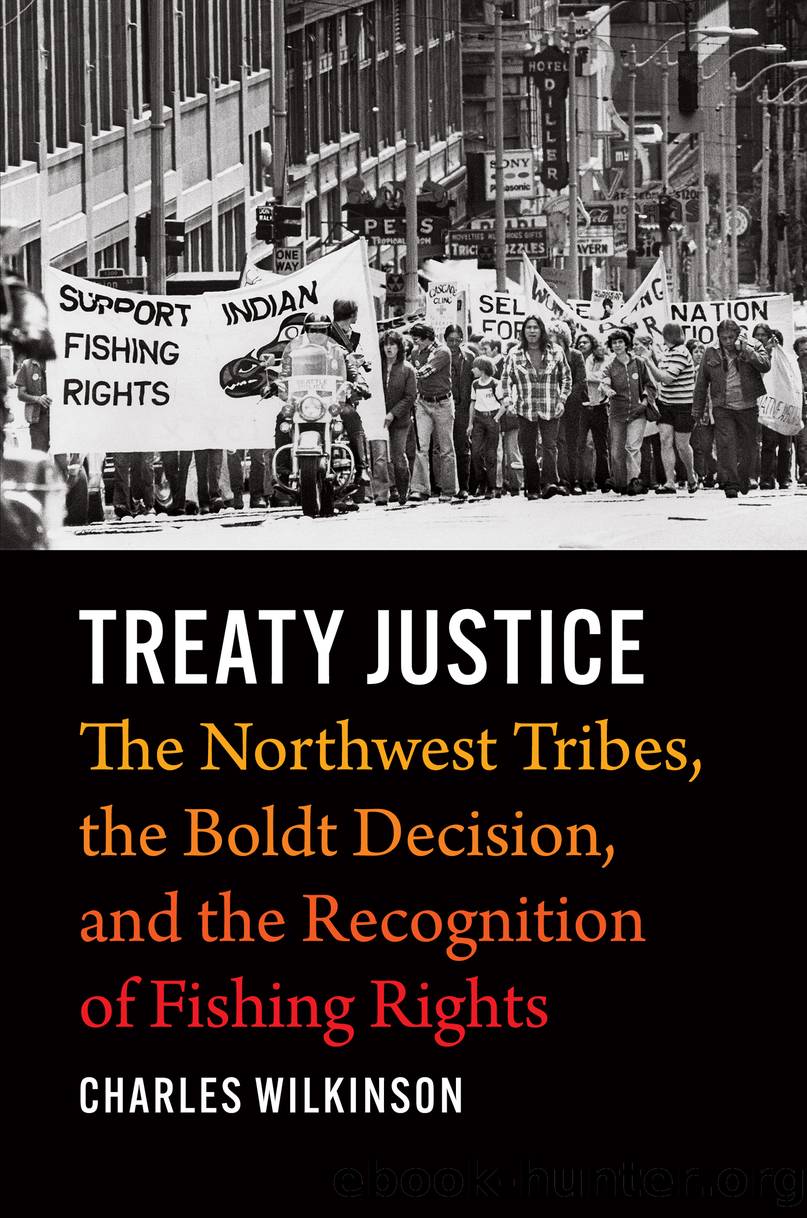Treaty Justice by Charles Wilkinson

Author:Charles Wilkinson
Language: eng
Format: epub
Publisher: University of Washington Press
After the trial and all lawyersâ arguments were completed, Judge Boldt turned to writing his opinion. By then he probably had decided that the tribes were entitled to a 50 percent share. But that didnât answer the burning question: who will regulate the harvesting of the tribeâs 50 percent shareâhalf of the entire fishery!âand assure good environmental practices so that the salmon will have healthy sustainable runs?
Judge Boldt came forth with a highly innovative approach that had never been tried before. He must have been working his idea through his mind continually, especially as he intently watched and listened to the many Indian people who took to the witness stand.
As he pointed out, Congress and the federal agencies had shown no intention of taking on that management of tribal fishing and, as Judge Boldt understood the law, the treaties did not allow for virtually any state regulation of tribal fisheries. He explained his thinking: âEver since the first Indian treaties were confirmed by the Senate, Congress has recognized that those treaties established self-government by treaty tribes.â He accurately recognized that, during the century after the treaties, Congress did limit tribal authority. But he gave examples that, especially in the decade leading up to his opinion, Congressional legislation âhas definitely been in the contrary direction.â Referring to the almost tangible swell of statutes, presidential actions, policies, and court cases supporting tribal sovereignty and self-determination that he and others saw and felt right up through the trial, he wrote this:
These measures and others make plain the intent and philosophy of Congress to increase rather than diminish or limit the exercise of tribal self-government.â¦
The philosophy of Congress referred to above and the evidence in this case as a whole clearly indicate to this court that the time has now arrived, and this case presents an appropriate opportunity, to take a step toward applying congressional philosophy to Indian treaty right fishing in a way that will not be inconsistent with Puyallup I and Puyallup II and also will provide ample security for the interest and purposes of conservation.
In his decision, Judge Boldt set out a detailed set of qualifications and conditions that, if met by individual tribes, would entitle those tribes to qualify for self-regulation. Judge Boldt would rule, after tribal proposals and hearings, on whether individual tribesâ qualifications showed that the tribe would accept and abide by the requirements. The required qualifications and conditions included competent and responsible tribal leadership, a well-organized tribal government that could adopt and apply tribal off-reservation fishing regulations, trained personnel to police enforcement of the regulations, well-qualified experts in fisheries science and management, official tribal membership rolls and individual tribal membership cards, and full fish catch reports.
As for particular tribes, Judge Boldt made a formal fact finding in his opinion based on âuncontradicted evidenceâ that the Quinault and Yakama Tribes met the standards and would be able to exercise sovereign self-management. He added that âthe evidence indicates several other plaintiff tribes have capacity for, and are not far
Download
This site does not store any files on its server. We only index and link to content provided by other sites. Please contact the content providers to delete copyright contents if any and email us, we'll remove relevant links or contents immediately.
| Antitrust | Civil Law |
| Emigration & Immigration | Federal Jurisdiction |
| Housing & Urban Development | Indigenous Peoples |
| Land Use | Public |
| Public Contract | Public Utilities |
| Urban, State & Local Government |
Machine Learning at Scale with H2O by Gregory Keys | David Whiting(4313)
Killers of the Flower Moon by David Grann(4055)
Oathbringer (The Stormlight Archive, Book 3) by Brandon Sanderson(3216)
Will by Will Smith(2920)
Once Upon a Broken Heart by Stephanie Garber(2860)
Guns, Germs and Steel by Diamond Jared(2372)
It Starts With Us (It Ends with Us #2) by Colleen Hoover(2367)
Borders by unknow(2315)
Friends, Lovers, and the Big Terrible Thing by Matthew Perry(2230)
The Room Where It Happened by John Bolton;(2159)
The Color of Law by Richard Rothstein(1950)
A Short History of War by Jeremy Black(1848)
HBR's 10 Must Reads 2022 by Harvard Business Review(1845)
The Strength In Our Scars by Bianca Sparacino(1844)
A Game of Thrones (The Illustrated Edition) by George R. R. Martin(1746)
Water Rights and the Environment in the United States by John Burch(1687)
515945210 by Unknown(1667)
Examples & Explanations: Administrative Law by William F. Funk & Richard H. Seamon(1646)
That Every Man Be Armed by Stephen P. Halbrook(1583)
